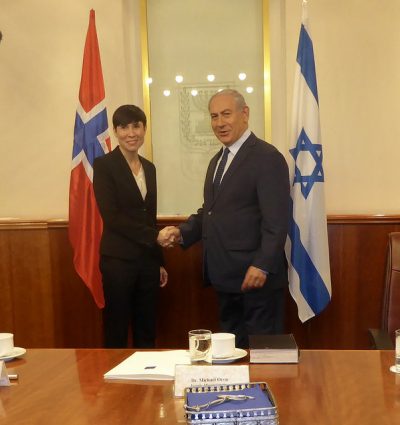The Norwegian government, actively involved in Middle East peace talks for years, has toughened its stance against a new plan unveiled earlier this week by the controversial leaders of the US and Israel. Norway usually goes along with US policy, but the plan presented by US President Donald Trump has now been branded as “unacceptable.”

Foreign Minister Ine Eriksen Søreide sharpened her description of the plan, not least after the widely negative reaction to it by by most of Norway’s political parties in Parliament. On Tuesday evening, she raised eyebrows by initially saying merely that it would be up to those involved in the plan “to decide whether this proposal can provide a basis for renewing negotiations.”
By Wednesday evening, after reportedly reading through the plan drafted by Trump’s son-in-law Jared Kushner and the Israelis, she was far more critical in her analysis. The glaring absence of Palestinian participation in the plan, along with how it could prompt Israel to simply annex Palestinian land it’s already been illegally occupying, were at the center of her objections.
“I warn against taking any one-sided steps,” Søreide wrote in a statement on behalf of the Norwegian government. “Any annexation of land area through the use of force is unacceptable and in violation of the rule of law.”
The United Nations has long held that Israel’s occupation of Palestinian territory is illegal, note other Norwegian leaders in Parliament. Now, they warn, Israel and its disputed prime minister, Benjamin Netanyahu, seem poised to do to the Palestinians what Russia did to the Ukrainians when Russian President Vladimir Putin annexed Crimea.

While the plan for which Trump is taking credit involves a long-urged two-state solution, Søreide stressed that only such a solution negotiated jointly by the Israelis and Palestinians can create lasting peace between them. The Palestinians have not been part of Kushner’s process and were not present when Trump unveiled the plan with Netanyahu by his side. Nor were several other Arab leaders, although they’d reportedly been invited.
Søreide also stressed that the framework of Norway’s engagement in the region remains in place: “Any initiative to resume the peace process must reflect the broad international agreement as defined in the Oslo Agreement and in the UN Security Council’s resolutions.” Newspaper Aftenposten noted on Thursday that Israel has never responded to UN demands that it withdraw from its illegal occupation of Palestinian lands, and has only avoided punishment thanks to US vetos of censure proposals.
No such “broad international agreement” with Trump’s plan was emerging this week, while the Palestinians themselves not only immediately rejected the plan but were actively demonstrating against it. In doing so they are also rejecting Trump’s promise of US aid totalling USD 50 billion to a new Palestinian state, but that’s because of what kind of state it would be.
“The type Trump sees for himself would be without sovereignty, without border control and split up in small areas surrounded by Israel,” Professor Nils Butenschoen, an expert on the Middle East at the Norwegian Center for Human Rights, told Aftenposten. “That’s like what we saw in South Africa under apartheid.”

The new Palestinian state as outlined by Trump and Netanyahu would also be demilitarized, without control over its own borders or air space, without even its own airport and with only limited control over water resources. Such a state would be under the full dominance of Israel, according to Butenschoen. As for the ongoing dispute over Jerusalem, the city that’s holy for Christians, Muslims and the Jewish people would remain “the undivided capital of Israel,” according to Trump, while the Palestinians would be offered to establish a capital in Abu Dis, five kilometers north of Jerusalem’s ancient center and outside its security barrier.
Asked whether he thinks the plan will be carried out, Butenschoen said “no,” but he and others were already worrying that Israel would swiftly move forward with annexation anyway, since Netanyahu has Trump’s support. Both men are in the midst of corruption and impeachment trials respectively, face upcoming elections, need to shift focus away from that and appeal to right-wing conservative voters. Several commentators were claiming this week that the two can help themselves by helping each other.
The Palestinians, meanwhile, are in a strategically weak situation, Butenschoen noted: “They could go to the UN or resort to violence that always gets beaten down.” With so many other major conflicts in the Middle East at present, their Arab supporters have other priorities.
‘This is not fair play’
Several Norwegian politicians were calling on Søreide to outright condemn what some called “Trump’s occupation plan.” Anniken Huitfeldt of the Norwegian Labour Party who leads the Parliament’s defense and foreign affairs committee, claimed “an agreement must have legitimacy. This plan does not have that. The Norwegian foreign minister should state that clearly.”
Liv Signe Navarsete of the Center Party told news bureau NTB that Søreide should “clearly distance herself” from the plan. Audun Lysbakken of the Socialist Left party was most outspoken: “Trump’s occupation plan is a serious attack on the rule of law and the international world order. This is not fair play. Israel is getting help from the biggest bully in the class (Trump) to kick the Palestinians while they’re down on the ground.”
Norwegian People’s Aid, a humanitarian group that’s been active in the Middle East for decades, noted that when Norway itself is campaigning for a seat on the UN Security Council, “we should of course actively defend the rule of law and the rights of the Palestinians.”
Norwegian newspapers Dagsavisen and Aftenposten also editorialized against Trump’s plan, with Dagsavisen referring to “Trump’s false peace” and warning that the plan can be downright dangerous. Aftenposten predicted “small chances” for the plan to succeed, since the Palestinians weren’t involved and the US has so clearly taken the side of their enemy.
newsinenglish.no/Nina Berglund

